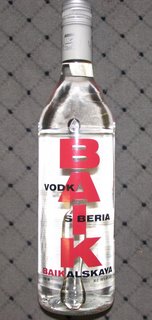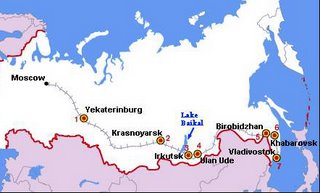Citable No. 33: TTAB Affirms 2(e)(2) Refusal of "BAIKALSKAYA" as Geographically Descriptive of Vodka
In its 33rd citable decision of 2006, the Board affirmed a Section 2(e)(2) refusal to register the mark BAIKALSKAYA for vodka, finding the mark to be primarily geographically descriptive. In re Joint Stock Company "Baik", 80 USPQ2d 1305 (TTAB 2006). The Board's conclusion that Lake Baikal in Russia is neither obscure nor remote was key to the ruling.

Examining Attorney Esther Belenker contended that, when translated into English, BAIKALSKAYA means "from Baikal;" that Baikal is the name of a lake in Russia; that Applicant is located in Irkutsk, a city near the lake; and that Applicant's vodka products are "manufactured and bottled with water piped directly from Lake Baikal." She further contended that Lake Baikal is not an obscure place and that the translation "from Baikal" will be apparent to the 700,000 Russian speakers in the United States.
In support of her contentions, the Examining Attorney submitted dictionary entries for Lake Baikal (the world's largest fresh water lake) and Irkutsk (an industrial center and major stop on the Trans-Siberian Railroad), Lexis/Nexis printouts, excerpts from travel websites, and materials indicating the number of Russian speakers in this country.
Applicant argued that Lake Baikal is remote, that a very small percentage of Americans visit Russia, and that the American public lacks even general geographic knowledge: "Many Americans could not find the Atlantic Ocean on a globe and very few could name the five Great Lakes located in the United States." [TTABlog answer: Lake Michigan, Lake of the Ozarks, Salt Lake, Veronica Lake, and Lake Ness]. In short, "the average American consumer does not speak or understand the meaning of the expression 'BAIKALSKAYA.'" Applicant also pointed out that it owned a now-cancelled (Section 8) registration for the same mark.
The Board applied its standard test for geographical descriptiveness: (1) is the term the name of a place known generally to the public?; and (2) would the public make a goods/place association, i.e., would it believe that the goods originate in that place? When the goods do, in fact, emanate from the place named, a goods/place association is presumed.
Based on the record evidence, including numerous newspaper articles from across the United States that refer to the lake in connection with "subjects ranging from tourism to ecology to oil production," the Board concluded that BAIKAL is not a remote or obscure place. [TTABlog comment: the lake may not be obscure, but it seems pretty remote to me.] Although the Board is concerned with the perception of vodka consumers rather than the public as a whole, even the public at large "is exposed to references to Lake Baikal and certainly the Russian-speaking public is even more likely to be aware of the geographic significance of the mark." Furthermore, the adjectival form BAIKALSKAYA "retains its geographic significance."
Applicant did not dispute the PTO's contention that Applicant makes vodka from the waters of Lake Baikal, or that it produces various vodkas from a location near the lake. Moreover, Applicant reportedly plans to make its BAIKALSKAYA vodka from the waters of Lake Baikal. Irkutsk is "one of the main export regions of Russian vodka, and Applicant is one of the largest producers in the region."

Applicant's ownership of a now-cancelled registration was of no help. First, a cancelled registration is not entitled to any of the statutory presumptions of Section 7(b) of the Trademark Act. Second, prior decisions by examining attorneys are not binding on the TTAB.
The Board therefore concluded that BAIKALSKAYA is primarily geographically descriptive of Applicant's vodka.
Text Copyright John L. Welch 2006.




0 Comments:
Post a Comment
<< Home